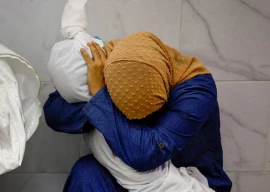
TASHKENT:
Having hosted the historical Tashkent Declaration, a peace agreement between India and Pakistan on January 10, 1966, the Senate House of Uzbekistan still presents a majestic view.
The grandiose building stands tall but the oaths and promises sworn at the declaration stand no longer.
It was all shattered into pieces years later when the neighbours engaged in a second war in 1971, leading to the accession of East Pakistan and along the way ignoring the pledges made in this city.
The peace agreement was moderated by the former Soviet Union after India and Pakistan engaged in war in 1965.
The meeting began on January 4, 1966, and was chaired by then USSR premier Alexei Kosygin with then president Ayub Khan from Pakistan and Indian prime minister Lal Bahdur Shastri.
Opening the peace talks, the chairman of the ministers’ council, Kosygin, said in his address: “Dear Mr president and dear Mr prime minister, we are glad to meet you, the outstanding leaders of the Asiatic countries, India and Pakistan, at Tashkent, the capital of Uzbek Socialistic Republic.
“Our people feel a sincere respect and friendship to the people of these countries. With complete satisfaction the Soviet government has got an agreement from the president of Pakistan and prime minister of India to meet in Tashkent and establish the direct contacts for better cooperation, for putting the end to the conflict between India and Pakistan.”
After Kosygin’s address the Indian prime minister Shastry said: “It is with great pleasure that I express our gratitude for the great hospitality and care that we feel. The warm reception by the Tashkent people is very moving. We immediately accepted your invitation to take part in the Tashkent meeting. We were guided by the noble aim of establishing peace, no doubt. The peace is vitally necessary for India and for Pakistan. We shall be able to open a new chapter in the history of the Indian-Pakistan relationship.”
In response to Shastry’s address, Ayub Khan said: “My delegation and I were deeply moved by the warm and spontaneous reception of the people that are living in this historical and beautiful Uzbek Republic capital. We have many similar traditions and culture and share many memories of the great past with the people of this region. It is remarkable that this city was chosen as a place for hosting this historical conference. Here we are hoping to find a new direction for our future which will be based on comprehension, good will and cooperation. Tashkent is recalling the past and at the same time is denoting the future.”
Published in The Express Tribune, January 7th, 2012.
COMMENTS (9)
Comments are moderated and generally will be posted if they are on-topic and not abusive.
For more information, please see our Comments FAQ


































































Great. an innovative form for old stuff
The topic is good, it should be further discussed by the high ups of both the countries
@venky. broken promises are both India and Pakistan engaged in another war and broke their promise of Tashkent Declaration. we all should read the history of Bangladesh creation to reach the reality
What is in this article? Why the author did not elaborate what are broken promises? When a neighbor bent upon putting his house on fire and threatening the neighbor's house too, is is not fair to try to put of the fire.
We remember Tashkent as the destination for a Prime Minister who never made the return journey. He died there and the Coroner would not issue his Death Certificate even when commanded to do so. "None is forgotten; Nothing is forgotten!" Yet India, as the disciplined nation, honoured the word her Prime Minister had given!
Nice story Sir! It was very informative for me
"It was all shattered into pieces years later when the neighbours engaged in a second war in 1971, leading to the accession of East Pakistan"
The entire article is pointless.
East Pakistan became independent Bangladesh and did not join India. It is clear to all now even in Pakistan that it was all PAK making and has nothing to do with India to start with.
The Tashkent agreement was the basis for Simla agreement. PAK broke it again with Kalistan fiasco, again in Kashmir fiasco, and again in Kargil fiasco and now paying the price for it.
If the reporter wants to write an article about Tashkent that is different. The senate building is of beautiful architecture and the city is fantastic. But facts and fiction should be separate.
Peace, at that time, was considered necessary for both India and Pakistan but till this time both the states are being played in the hands of some powerss. they should have recognized it long before